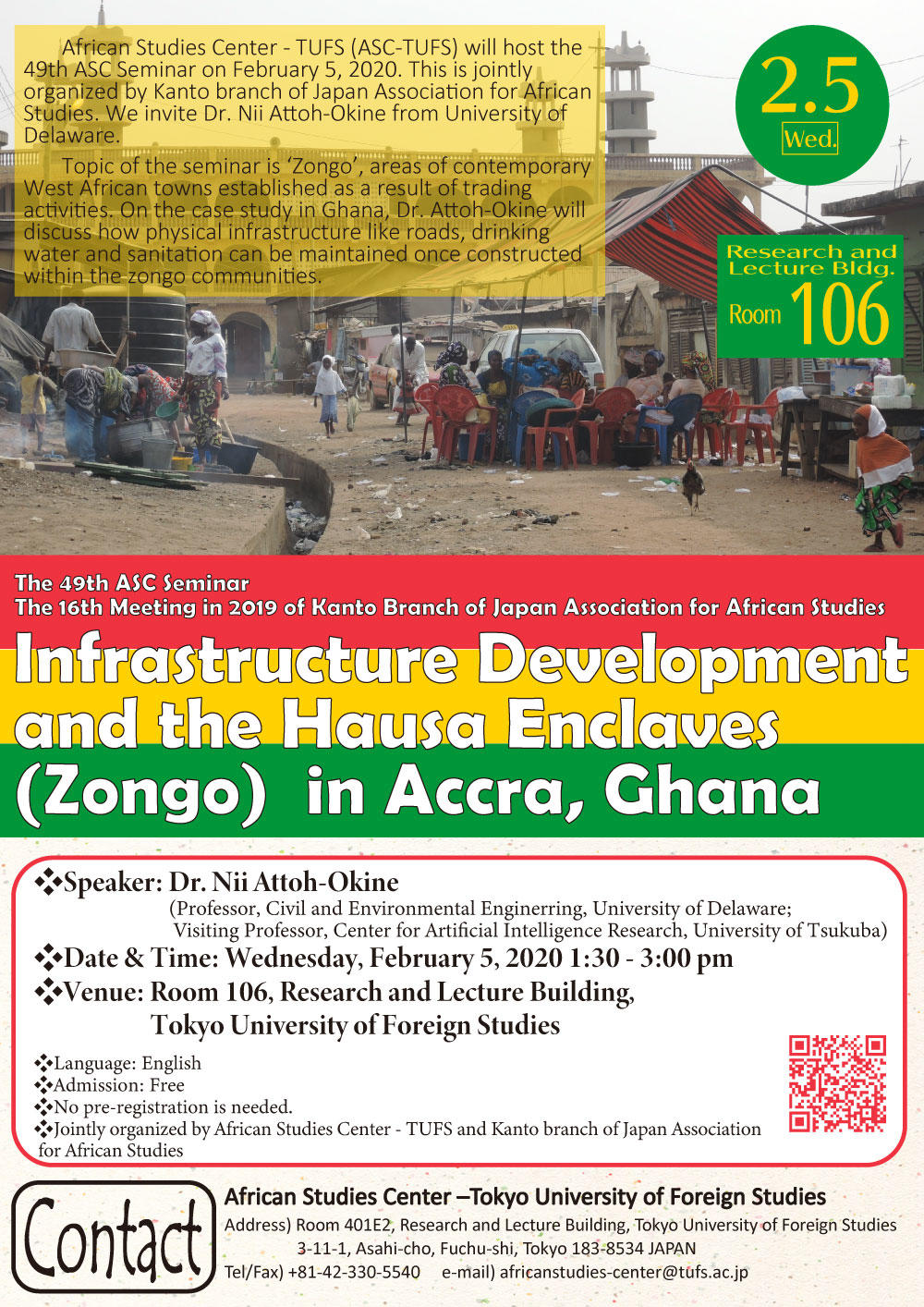African Studies Center - TUFS (ASC-TUFS) will host the 49th ASC Seminar on February 5, 2020. This is jointly organized by Kanto branch of Japan Association for African Studies. We invite Dr. Nii Attoh-Okine from University of Delaware.
Topic of the seminar is 'Zongo', areas of contemporary West African towns established as a result of trading activities. On the case study in Ghana, Dr. Attoh-Okine will discuss how physical infrastructure like roads, drinking water and sanitation can be maintained once constructed within the zongo communities.
◆Title: Infrastructure Development and the Hausa Enclaves (Zongo) in Accra, Ghana
◆Speaker: Dr. Nii Attoh-Okine
(Professor, Civil and Environmental Enginerring, University of Delaware; Visiting Professor, Center for Artificial Intelligence Research, University of Tsukuba)
◆Abstract: Zongos are areas of contemporary West African towns established as a result of trading activities. In Ghana, they mostly came into existence before colonization. The word 'Zongo' comes from the Hausa 'zango,' which means 'temporary settlement.' Contemporary Zongos are often characterized by overcrowding and inadequate sanitation, and represent, both symbolically and practically, a condition that is between inclusion and exclusion. For example, a classical example of Zongo is Nima (Accra) which was settled in 1931 by Hausa cattle dealers. In 1947 the colonial town planning office complained about rapid growth of the area, and how residents constructed homes, kiosks, and mosques wherever they could find land, often without direct access to roads, water, a good sanitation system, among others. The government of Ghana in the recent years formed a new Ministry of Inner City and Zongo Development. The main objective of this Ministry is to develop an inclusive and sustainable inner city and Zongo. In this talk, I will discuss how physical infrastructure like roads, drinking water and sanitation can be maintained once constructed within the zongo communities. How basic "report cards" can collected by the opinion leaders in the Zongo communities and also introduce the youth to basic infrastructure monitoring and assessment in their community.
◆Short Bio: Nii Attoh-Okine is a Full Professor at the Civil and Environmental Engineering Department, University of Delaware, United States. His research interests are in the area of resilience engineering, computational intelligence and large data analytics in infrastructure systems and smart cities. He serves as an Associate Editor of various journals; few examples include ASCE American Society of Civil Engineers/American Society of Mechanical Engineers (ASME) Journal of Risk and Uncertainty, ASCE Journal of Computing in Civil Engineering. He is also on the Editorial Board of the Journal of Construction and Building Materials. He is the author of the following books: Resilience Engineering: Models and Analysis [Cambridge Press 2016], and Big Data and Differential Privacy: Analysis Strategies for Railway Track Engineering [John Wiley, 2017].
◆Date & Time: Wednesday, February 5, 2020 1:30 - 3:00 pm
◆Venue: Room 106, Research and Lecture Building,
Tokyo University of Foreign Studies
◆Language: English
◆Admission: Free
◆No pre-registration is needed.
◆Jointly organized by African Studies Center - TUFS and Kanto branch of Japan Association for African Studies


